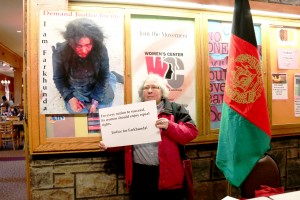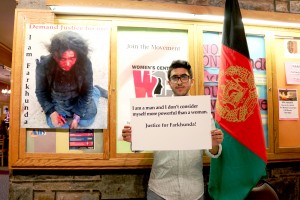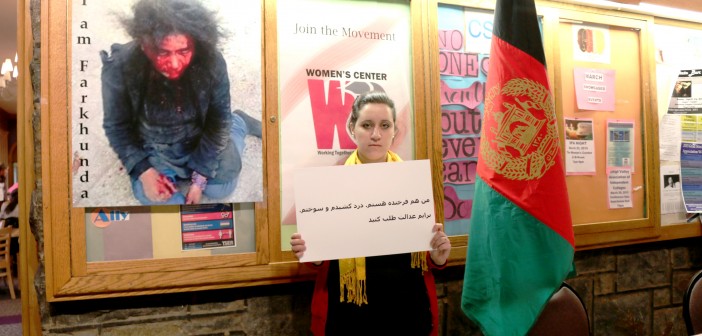
Chair of the Department of Sociology and Anthropology, Nikki Tannenbaum, attends Farkhunda’s Memorial on the second floor of the U.C. on Monday, March 30, 2015, sponsored by the Fulbright Association, Global Union, and Department of Sociology and Anthropology. Farkhunda is a woman from Afghanistan who was burned and beaten alive for falsely being accused of mocking the Qur’an. (Toni Isreal/B&W photo)
After being falsely accused of burning the Quran, Farkhunda, a 27-year-old Islamic law student, was beaten, run over by a car, burned and thrown off of a bridge by a male mob in Kabul, Afghanistan on March 19.
A memorial was held in honor of Farkhunda by the Global Union in the University Center on Monday.
Since Farkhunda’s murder, the #JusticeForFarkhunda movement has grown throughout the world. Hearing about this global movement, Hamid Akbary, a Fulbright graduate student at Lehigh from Afghanistan, decided to take action.
Akbary collaborated with the Lehigh Global Union and the department of sociology and anthropology to hold a memorial for Farkhunda at Lehigh.
“Women’s rights is not an Afghan issue, it’s a global issue,” Akbary said.
In order to raise awareness for the movement, students were asked to hold signs that advocated for justice and women’s rights. Some of the signs included phrases such as: “For every nation to succeed, its women should enjoy equal rights. Justice for Farkhunda!” and “Neither Islam, nor the Afghan constitution support the killing of Farkhunda. Punish Farkhunda’s murderers!”
The students’ pictures were then taken with these signs, and there are plans to post these images on social media sites.
“The main purpose of the event is to support the movement of women’s rights around the world and to put pressure on the Afghan government,” said Savannah Boylan, ’15, the president of the Lehigh’s Global Union.
Boylan added that Farkhunda’s murder, something that occurred halfway around the world, could have an impact on Lehigh students, as well.
“We tend to live in a Lehigh bubble, and sometimes it is hard to think about the Middle East,” said Nikki Tannenbaum, the chair of the department of sociology and anthropology. “Bad things happen in almost every religion, not just in Islam. It’s important to keep in mind that this is not just a religious issue, it’s an issue of human rights.”
Radja Benmansour, a Fulbright graduate student from Algeria, stressed the importance of getting involved in these gender violence issues for women across all nations.
“I wish there were even more American students involved in this protest,” Benmansour said.

Students attend the memorial for Farkhunda on Monday, March 30, 2015, sponsored by the Fulbright Association, Global Union, and Department of Sociology and Anthropology. Farkhunda is an Afghan woman who was burned and beaten alive for falsely being accused of mocking the Qur’an. (Toni Isreal/B&W photo)
Gerardo Calderón, a Lehigh alumnus and the assistant director of the South Side Initiative, also emphasized the fact that Lehigh students are so embedded in campus life that they struggle to look outside of their classes, professors and friends.
“This issue requires humanitarian help and sympathy,” Calderón said. “It goes beyond women’s rights. It is about brutality and humanity.”
Akbary said pressure must be placed on the Afghan government to implement the laws that protect women’s rights.
“My presence and the presence of other Fulbright students is important because we can raise our voices and demand the focus of the US government, and push them to monitor how the aid is distributed in Afghanistan,” he said. “The Afghan government needs to take advantage of the aid as long as possible. If it does not, women won’t teach their children the importance of education and rights, and history will repeat itself.”
Benmansour commented on how powerful Hamid’s presence is at Lehigh. He is not only raising awareness for the #JusticeForFarkhunda movement here, but he is also concerned with what is happening back at his home and how the consciousness of American students can positively affect the people of Afghanistan.
“This is one piece of pressure that we can add to the collective pressure on extremists in Afghanistan,” Akbary said. “It is a great message for people to lead the country against extremism, and not to destroy the country once again.”






Comment policy
Comments posted to The Brown and White website are reviewed by a moderator before being approved. Incendiary speech or harassing language, including comments targeted at individuals, may be deemed unacceptable and not published. Spam and other soliciting will also be declined.
The Brown and White also reserves the right to not publish entirely anonymous comments.